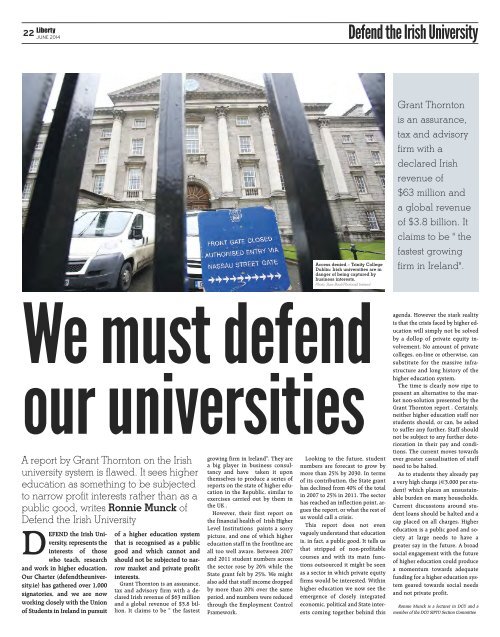SIPTU Liberty Newspaper June 2014
Create successful ePaper yourself
Turn your PDF publications into a flip-book with our unique Google optimized e-Paper software.
22<br />
<strong>Liberty</strong><br />
JUNE <strong>2014</strong><br />
Defend the Irish University<br />
Access denied – Trinity College<br />
Dublin: Irish universities are in<br />
danger of being captured by<br />
business interests.<br />
Photo: Sam Boal/Photocall Ireland<br />
Grant Thornton<br />
is an assurance,<br />
tax and advisory<br />
firm with a<br />
declared Irish<br />
revenue of<br />
$63 million and<br />
a global revenue<br />
of $3.8 billion. It<br />
claims to be " the<br />
fastest growing<br />
firm in Ireland".<br />
We must defend<br />
our universities<br />
A report by Grant Thornton on the Irish<br />
university system is flawed. It sees higher<br />
education as something to be subjected<br />
to narrow profit interests rather than as a<br />
public good, writes Ronnie Munck of<br />
Defend the Irish University<br />
DEFEND the Irish University,<br />
represents the<br />
interests of those<br />
who teach, research<br />
and work in higher education.<br />
Our Charter (defendtheuniversity.ie)<br />
has gathered over 1,000<br />
signatories, and we are now<br />
working closely with the Union<br />
of Students in Ireland in pursuit<br />
of a higher education system<br />
that is recognised as a public<br />
good and which cannot and<br />
should not be subjected to narrow<br />
market and private profit<br />
interests.<br />
Grant Thornton is an assurance,<br />
tax and advisory firm with a declared<br />
Irish revenue of $63 million<br />
and a global revenue of $3.8 billion.<br />
It claims to be " the fastest<br />
growing firm in Ireland". They are<br />
a big player in business consultancy<br />
and have taken it upon<br />
themselves to produce a series of<br />
reports on the state of higher education<br />
in the Republic, similar to<br />
exercises carried out by them in<br />
the UK .<br />
However, their first report on<br />
the financial health of Irish Higher<br />
Level Institutions paints a sorry<br />
picture, and one of which higher<br />
education staff in the frontline are<br />
all too well aware. Between 2007<br />
and 2011 student numbers across<br />
the sector rose by 26% while the<br />
State grant felt by 25%. We might<br />
also add that staff income dropped<br />
by more than 20% over the same<br />
period, and numbers were reduced<br />
through the Employment Control<br />
Framework.<br />
Looking to the future, student<br />
numbers are forecast to grow by<br />
more than 25% by 2030. In terms<br />
of its contribution, the State grant<br />
has declined from 40% of the total<br />
in 2007 to 25% in 2011. The sector<br />
has reached an inflection point, argues<br />
the report, or what the rest of<br />
us would call a crisis.<br />
This report does not even<br />
vaguely understand that education<br />
is, in fact, a public good. It tells us<br />
that stripped of non-profitable<br />
courses and with its main functions<br />
outsourced it might be seen<br />
as a sector in which private equity<br />
firms would be interested. Within<br />
higher education we now see the<br />
emergence of closely integrated<br />
economic, political and State interests<br />
coming together behind this<br />
agenda. However the stark reality<br />
is that the crisis faced by higher education<br />
will simply not be solved<br />
by a dollop of private equity involvement.<br />
No amount of private<br />
colleges, on-line or otherwise, can<br />
substitute for the massive infrastructure<br />
and long history of the<br />
higher education system.<br />
The time is clearly now ripe to<br />
present an alternative to the market<br />
non-solution presented by the<br />
Grant Thornton report . Certainly,<br />
neither higher education staff nor<br />
students should, or can, be asked<br />
to suffer any further. Staff should<br />
not be subject to any further deterioration<br />
in their pay and conditions.<br />
The current moves towards<br />
ever greater casualisation of staff<br />
need to be halted.<br />
As to students they already pay<br />
a very high charge (€3,000 per student)<br />
which places an unsustainable<br />
burden on many households.<br />
Current discussions around student<br />
loans should be halted and a<br />
cap placed on all charges. Higher<br />
education is a public good and society<br />
at large needs to have a<br />
greater say in the future. A broad<br />
social engagement with the future<br />
of higher education could produce<br />
a momentum towards adequate<br />
funding for a higher education system<br />
geared towards social needs<br />
and not private profit.<br />
Ronnie Munck is a lecturer in DCU and a<br />
member of the DCU <strong>SIPTU</strong> Section Committee


